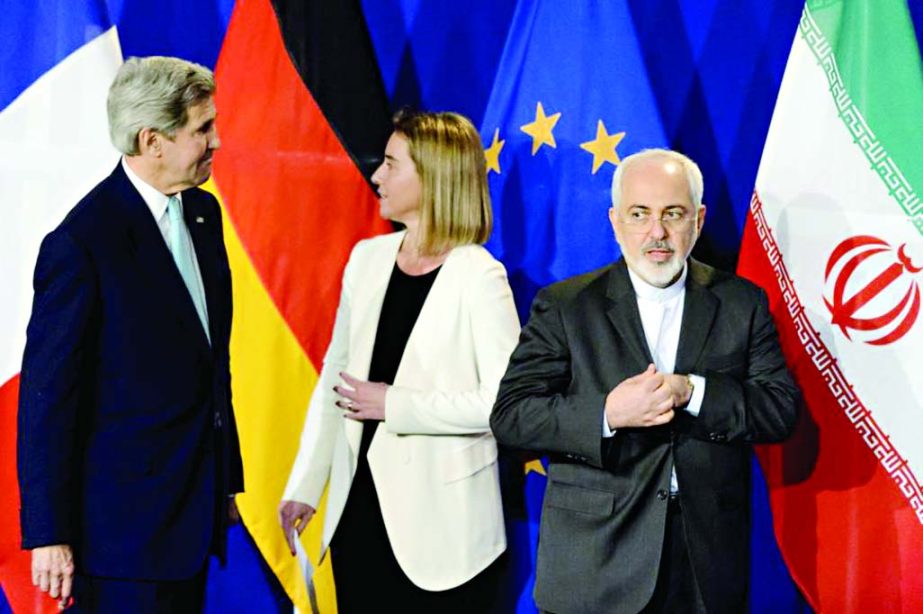
Agencies, Lausanne :The United States, Iran and five other world powers have sealed a breakthrough framework agreement outlining limits on Iran’s nuclear programme to keep it from being able to produce atomic weapons.Reading out a joint statement on Thursday evening, EU foreign policy chief Federica Mogherini said a “decisive step” has been achieved.”This is a crucial decision laying the agreed basis for the final text of joint comprehensive plan of action. We can now start drafting the text and annexes,” said Mogherini, who has acted as a coordinator for the six powers – Britain, China, France, Germany, Russia and the United States.The US and Iran each hailed the efforts of their diplomats over eight days of marathon talks in Swiss city of Lausanne.Speaking at the White House, US President Barack Obama called it a “good deal” that would address concerns about Iran’s nuclear ambitions. The US president said that the US and its allies had “reached a historic understanding with Iran”.Iranian Foreign Minister Mohammad Javad Zarif called it a “win-win outcome”.The Islamic Republic has been promised an end to years of crippling economic sanctions, but only if negotiators transform the plan into a comprehensive pact by June 30.US Secretary of State John Kerry said the agreement in Lausanne was a “solid foundation for a good deal”.Al Jazeera’s James Bays, reporting from Lausanne, said that US diplomats still faced the challenge of convincing opposition Republican dissenters in Congress, and its strongest ally, Israel, that the deal was sufficient.”There are a lot of places where this deal will not be accepted and one of those is Israel,” Bays said.Obama said his security officials would be working with Israel and Arab states, including Saudi Arabia, to make sure their concerns are addressed.Meanwhile, Iranians celebrated in the streets after negotiators reached a framework for a nuclear deal that could bring their country in from the cold, hailed by U.S. President Barack Obama as an “historic understanding” with an old adversary.The tentative agreement, struck on Thursday after eight days of talks in Switzerland, clears the way for negotiations on a settlement aimed at allaying Western fears that Iran was seeking to build an atomic bomb and in return lift economic sanctions on the Islamic Republic.It marks the most significant step toward rapprochement between Iran and the United States since they became enemies with the 1979 Iranian revolution. But the deal still requires experts to work out difficult details over three months.Obama and Iranian President Hasan Rouhani, who both took risks to open the dialogue, will each have to sell the deal to skeptical conservatives at home.With many details still up in the air, France cautioned on Friday against overoptimism. Israeli Prime Minister Benjamin Netanyahu, who has the ear of U.S. opposition Republicans, fumed against an arrangement he said could lead to nuclear proliferation and war in the Middle East.Agencies add: Israel’s security cabinet is united in its opposition to the framework deal reached between world powers and Iran, Prime Minister Benjamin Netanyahu’s office said in a statement issued following a special meeting.Local media reported that Netanyahu had called a meeting of his security cabinet, including ministers, as well as senior officials from Israel’s security services on Friday, after expressing his “vehement” opposition to the deal.The agreement on the outlines of a nuclear deal with Iran, a country deeply involved in the Middle East’s web of bloody conflicts, is unlikely to help defuse the region’s sectarian wars and could even widen fault lines, Arab officials and people across the region say.

